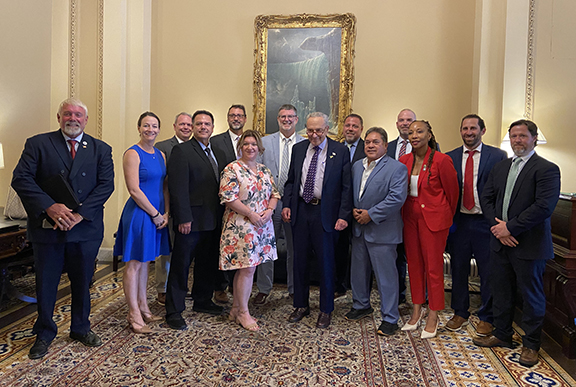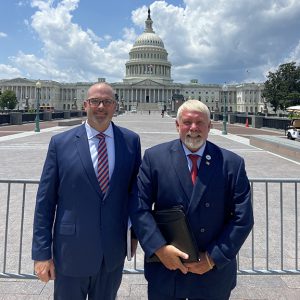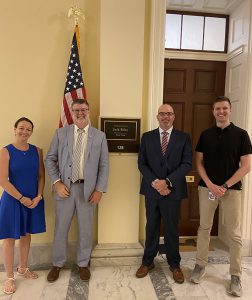Liberty superintendent visits D.C. to advocate for schools

Liberty Central School District Superintendent Dr. Patrick Sullivan recently spent time in Washington, D.C., to advocate for funding and programs that would help provide a quality education for all students at Liberty and beyond.
He took part in the Legislative Advocacy Conference, sponsored by the AASA The School Superintendents Association and the Association of School Business Officials International, to learn more about and discuss key issues impacting school districts, as well as meet with federal elected officials

Dr. Sullivan and Dr. Dwight Bonk from the Wappingers Central School District advocated for the Hudson Valley schools to ensure that they receive Title funding, IDEA funding, and other federal funding sources to support their students.
High on the list of proprieties for the conference was communicating the impact the federal government delaying Title funding of more than $6 billion has had on finalizing district budgets for the 2025-26 school year.
The funding cuts and changes in the president’s 2026 budget proposal were also a concern.
The “K-12 Simplified Funding Program” would consolidate 18 formula and competitive grant programs (worth $6.5 billion at fiscal year 2024 levels) into one block grant of $2 billion. It would also eliminate other programs, most notably Title III (English Acquisition) and Title I, Part C (Migrant Education State Grants).
“While I appreciate the intent behind the proposal to provide more flexibility for local decision making, the overall cut in funding would ultimately take away much needed resources for our schools,” Dr. Sullivan said.

The group also advocated for fully funding the Individuals with Disabilities Education Act, which is vital to ensuring students with disabilities are provided a quality, robust education. IDEA would also be consolidated under the president’s proposal, with an increase in grants to states, but numerous programs inside IDEA losing all funding.
When IDEA was founded 50 years ago, Congress committed to funding 40% of the additional cost of educating student needs, which it has never done. The federal funding is now around 10%.
“Fully funding IDEA would be a worthwhile investment in our students and their future,” Dr. Sullivan said.
Conference attendees also advocated for the passage of updated student data and privacy legislation as well as reauthorization of the Secure Rural Schools program
“It is important to let our elected officials know how their decisions will impact our schools, our staff and our students,” Dr. Sullivan said. “I am happy to be able to advocate for our students to meet our mission to empower each student to contribute and thrive in a diverse community by pursuing their potential.

